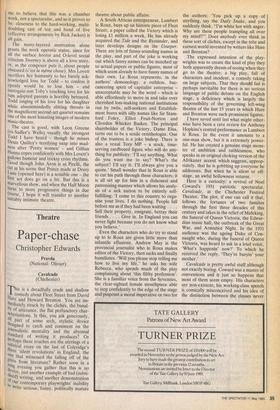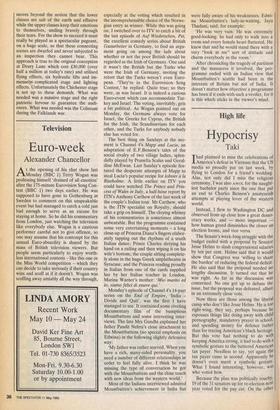Theatre
Paper-chase
Christopher Edwards
Pravda (National: Olivier)
Cavalcade (Chichester) This is a dreadfully crude and shallow comedy about Fleet Street from David Hare and Howard Brenton. You are im- 9tediately struck by the clichés, the banal- ity of utterance, the flat perfunctory char- acterisations. Is this, you ask generously, Part of some arch, stylistic device `.1esigned to catch and comment on the Journalistic mentality and the abysmal standard of writing it produces? Or Perhaps these touches are the stirrings of a satirical essay on the last of Coleridge's three 'silent revolutions' in England, the iine that witnessed the falling off of the kess from literature? Rather soon in a ,Tng evening you gather that this is no me. vice, just another example of bad (subsi- thsed) writing, and another demonstration (,)1. our contemporary playwrights' inability 1" write serious, funny, politically mature
theatre about public affairs.
A South African entrepreneur, Lambert le Roux, buys up an historic piece of Fleet Street, a paper called the Victory which is losing Ll million a week. He has already acquired the Tide and the Bystander, and later develops designs on the Usurper. There are lots of funny-sounding names in the play, and part of the joke is working out which funny names can be matched up to actual papers or public figures, most of which seem already to have funny names of their own. Le Roux represents, in the authors' demonology, a ruthless, buc- caneering spirit of capitalist enterprise — unacceptable may be the word — which is able effortlessly to move in and take over cherished loss-making national institutions run by twits, self-seekers and Establish- ment bores with silly names like Sir Stam- ford Foley, Elliot Fruit-Norton and Cliveden Whicker Basket. The principal shareholder of the Victory, Dame Elsa, turns out to be a senile ornithologist. One of the trustees is a joke bishop. There is also a venal Tory MP — a stock, time- serving cardboard figure who will do any- thing for publicity: 'I'll say anything. What do you want me to say? What's the subject? I'll say it. I'll always give you a quote.' Small wonder that le Roux is able to cut his path through these characters; it is all set up for him in a dishonest and patronising manner which allows his analy- sis of a sick nation to be entirely self- fulfilling: `I come to this country to orga- nise your lives. I do nothing. People fall before me as if they had been waiting . . . . Sell their property, emigrate, betray their friends . . . . Give in. In England you can never fight because you do not know what you believe.'
Even the characters who do try to stand up to le Roux are given little more than infantile effusions. Andrew May is the provincial journalist who le Roux makes
editor of the Victory, then sacks and finally
humiliates. Will you please stop telling me how to live my life,' he asks his wife Rebecca, who spends much of the play complaining about 'this filthy profession'. She is a familiar voice from the Seventies, the clear-sighted female mouthpiece able to step confidently to the edge of the stage and pinpoint a moral imperative or two for
the authors: `You pick up a copy of anything, say the Daily Snake, and you suddenly think, "I'm white hot with anger.
Why are these people trampling all over my mind?" Does anybody ever think in these sort of clichés, except in the trite and earnest world invented by writers like Hare and Brenton?
The expressed intention of the play- wrights was to create the kind of play they both apparently dream of seeing when they go to the theatre; a big play, full of characters and incident, a comedy taking on large subjects. That they should fail is perhaps inevitable for there is no serious language of public debate on the English stage, a deficiency which is largely the responsibility of the governing left-wing theatre of the last 15 years in which Hare and Brenton were such prominent figures. I have saved until last what might other- wise have been a rave review for Anthony Hopkins's central performance as Lambert le Roux. In the event it amounts to a one-man show, but it is extremely power- ful. He has created a genuine stage mons- ter of ambition and ruthlessness, who speaks in an original choking version of the Afrikaner accent which suggests, approp- riately, that he is gobbling up everyone he addresses. But when he is silent or off- stage, an awful hollowness returns.
Here is a curiosity: a revival of Noel Coward's 1931 patriotic spectacular, Cavalcade, at the Chichester Festival Theatre. The plot, if one can call it that, follows the fortunes of two families through the first three decades of this century and takes in the relief of Mafeking, the funeral of Queen Victoria, the Edwar- dian music hall, the outbreak of the Great War, and Armistice Night. In the 1931 audience was the ageing Duke of Con- naught who, during the funeral of Queen Victoria, was heard to ask in a loud voice, 'What's happenin' now?' To which he received the reply, 'They're buryin' your mother.'
Cavalcade is pretty awful stuff although not exactly boring. Coward was a master of conventions and it just so happens that most of them seem empty. His characters are non-existent; his working-class speech is comically misconceived and his idea of the distinction between the classes never moves beyond the notion that the lower classes are salt of the earth and effusive while the upper classes keep their emotions to themselves, smiling bravely through their tears. For the show to succeed it must really be played as a spectacular pageant, on a huge scale, so that these connecting scenes are dwarfed and never subjected to an inspection they cannot bear. This approach is true to the original conception at Drury Lane which cost 5.30,000 (over half a million at today's rate) and utilised flying effects, six hydraulic lifts and im- mensely* complicated stage and lighting effects. Unfortunately the Chichester stage is not up to these demands. What was needed was a massive stage and the right patriotic fervour to guarantee the audi- ences. What was needed was the Coliseum during the Falklands war.















































 Previous page
Previous page